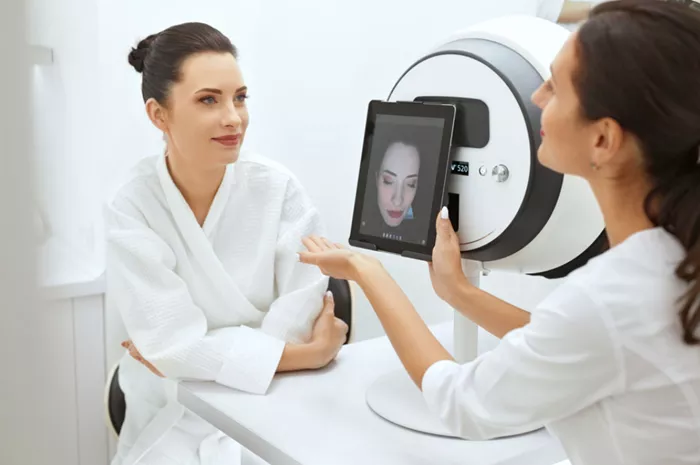The fascination with artificial intelligence transforming our perception of aging has taken a serious turn. From playful filters like FaceApp to advanced AI tools, technology is reshaping how individuals and businesses approach skincare and beauty.
On January 15, Haut.AI, a cutting-edge AI company supported by Ulta Beauty and a member of Nvidia’s start-up program, unveiled its groundbreaking AI-powered platform, SkinGPT. This platform provides businesses like Ulta Beauty, Clarins, Beiersdorf, and Unilever with advanced skin analysis capabilities. SkinGPT predicts future aging patterns based on facial photos and recommends products to counteract those effects. In addition, Haut.AI launched a consumer-facing platform, Generative Skin, which offers personalized skincare advice and simulated visualizations of potential results.
Transforming a Trend into a Tool
AI skin analysis is not entirely new, but it is gaining momentum as beauty brands strive to capitalize on advancements in artificial intelligence. The recent launch of SkinGPT follows a wave of AI-centered innovations showcased at CES in early January. Industry giants like L’Oréal and Amorepacific also debuted AI-driven tools at the event, signaling a collective pivot toward integrating technology into skincare solutions.
Anastasia Georgievskayaa, founder and CEO of Haut.AI, emphasized the evolution from simple social media filters to highly realistic, photorealistic simulations. Unlike filters that apply generic wrinkle patterns, SkinGPT utilizes clinical trial data and peer-reviewed research to generate personalized analyses and recommendations. With access to 30 sets of before-and-after photos from clinical studies, the platform bases its predictions and product suggestions on evidence-backed findings.
Big Names, Big Moves
Prominent beauty brands are already exploring the potential of Haut.AI’s technology. Clarins employs it for research and development, analyzing how products address specific skin conditions. Beiersdorf is considering integrating the platform into its Skinly tool, while Unilever’s Pond’s brand leverages SkinGPT for its AI-powered analysis tool in Southeast Asia. Ulta Beauty, a key investor in Haut.AI, also utilizes the technology for research and development, according to Michelle Pacynski, Ulta Beauty’s Vice President of Digital Innovation.
AI Meets Hardware: A New Frontier
The integration of AI with physical tools is expected to drive innovation in the beauty sector. L’Oréal unveiled its BioPrint device at CES, which measures skin protein levels to assess ingredient effectiveness, while Amorepacific launched an AI chatbot that provides tailored product recommendations based on skin tone and features.
“The fusion of AI with hardware creates a transformative opportunity for the beauty industry,” said Guive Balooch, L’Oréal’s Global Head of Augmented Beauty and Open Innovation.
Gaining Consumer Trust
For these innovations to succeed, brands must overcome a critical hurdle: earning consumer trust. While AI promises personalized and high-performance solutions, skepticism about accuracy and data privacy remains. Haut.AI plans to harness the virality potential of its tools, coupled with influencer marketing, to boost consumer adoption.
“The market is expanding because consumers demand better performance,” said Balooch. “But to shift their routines, we must first convince them of the technology’s reliability.”
The beauty industry’s AI revolution has only just begun. With cutting-edge tools like SkinGPT and the integration of AI into hardware, the future of personalized skincare looks more promising than ever.
Related topic:
MercyOne Genesis Plastic Surgery Expands After Dr. Eckhardt’s Retirement
Advancements in Cosmetic Surgery: ERAS Techniques Revolutionize Recovery
Plastic Surgeons Reveal Secrets Behind Celebrities’ Stunning Glow-Ups


